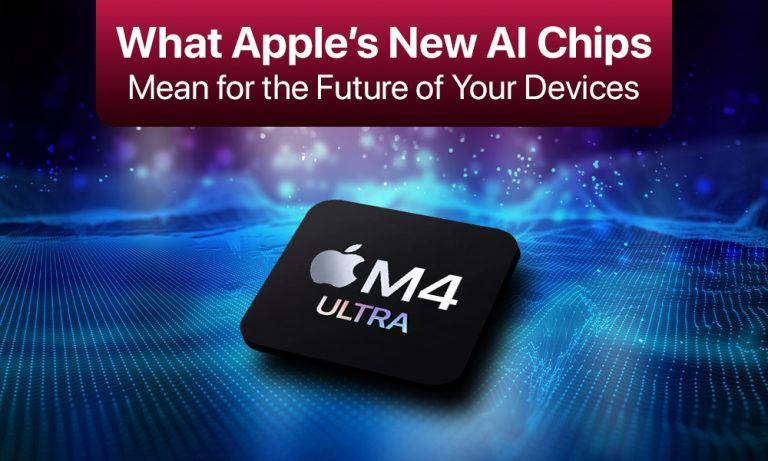Smart glasses, new laptops, and AI-powered servers, you name it! Artificial intelligence has great potential to revolutionize the world of devices, and Apple is very well aware of it. According to sources, we are to expect a new generation of Apple Silicon chips as early as 2026. Let’s dive deeper into what’s in the cards for Apple and how Apple AI Chips may empower Mac devices in the future.
What Do We Know About New Apple AI Chips?
New Apple Silicon chips are reportedly under development, and although the information is still primarily based on leaks and speculation, we have some plausible details to discuss. The leading information source so far has been Bloomberg, which claims that Apple is now working not only on M5 chips but also on newer server chips modeled.
The chips are referred to by code names “Comodo”, “Borneo”, “Balttra”, and “Sotra”. Here is what is currently known about these developments.
| Chip Name (Rumored) | Approximate year of release | Details |
| Comodo/ M6 | 2026 | Advanced processor mode (2nm or similar) |
| Borneo/ M7 | 2027 | More cores than previous models |
| Baltra | 2026 | More cores than M3 Ultra, advanced processes |
| Sotra | 2027 (or beyond) | High-end chip, might go beyond M-series |
Comodo
We are likely to witness the launch of “Comodo” SoCs sometime in 2026. The chip will correspond to the M6 chip generation. They are expected to demonstrate improved performance levels due to the substantial increase from 64 to 192 CPU cores.
Borneo
The Borneo chip, which is rumored to be equivalent to a M7 chip generation, is expected to be seen in the world no sooner than 2027. As the next generation after M6 chips, Borneo may sustain even more advanced system performance. It means Mac devices will be able to process a larger quantity of data and work under a heavier workload.
Baltra
You can also find hints and rumors circulating online about a standalone project, “Baltra”. This AI chip is likely being developed in co-partnership with Broadcom and will focus on Neural Processing Units. This technology may enable Mac devices to handle AI requests more efficiently and support Apple Intelligence.
Sotra
The most advanced technology in this list is undoubtedly Sotra Apple Silicon. It will likely be a pro version of AI chips and appear in higher-end Mac computers, such as MacBook Pros and iMac Pro-class models. Currently, there are no leaks regarding the number of CPU cores or the NPU speed.
What to Expect from New Apple AI Chips?
Based on the available information, we can speculate about the potential developments in Apple products and the changes that new Apple AI Chips may bring to the functionality of Macs, iPhones, and other Apple devices.
Improved Efficiency
The new M6 and M7 chips seem to be able to sustain the demands of newer, resource-intensive applications at a significantly higher level. If rumors are true and future M-series chips have more cores with up to 640 GPU, we are bound to witness a significant jump in the performance of Apple products.
Enhanced Performance (Pro Devices)
Sotra is thought to be revolutionary in terms of the performance of high-end Mac products. Users of the Pro or Ultra series can expect improved rendering and multitasking capabilities. These devices will also be able to handle AI requests locally.
Independent AI Features
The enhanced performance of Apple devices, empowered by potential developments in M-series chips, will undoubtedly impact the way Apple Intelligence functions on Macs and other products. We can expect more powerful AI engines and NPUs that will depend less on cloud connectivity. As a result, AI requests will be processed more efficiently, and natural language tasks will be enhanced.
Optimized Power Efficiency
AI optimization will likely lead to improved power efficiency. Users may soon see thinner and more battery-friendly devices appear on the market. Another possible implication of the new Apple AI Chip technology is wearables and smart glasses.
Launch of New Devices
New Apple chips have the potential to change the way multiple Apple products work. The technology is not limited to Macs, iPhones, and iPads only. Experts suggest that we see new generations of smart glasses, possibly around 2027. New Apple watches with built-in cameras are also likely to be launched.
Bottom Line: How Do Apple AI Chips Change the Game for Apple Users?
In conclusion, users will benefit from new Apple Silicon chips, which provide a significant performance boost across multiple Apple devices. Apple enthusiasts are likely to benefit from improved multitasking, better rendering of creative tasks, and enhanced AI request processing. Finally, the development of new products is quite possible. Such drastic changes in system performance and energy effectiveness are guaranteed to elevate your experience with Apple products to a brand-new level.
FAQs
1. Are Komodo, Borneo, Sotra, and Baltra official names for new Apple AI Chips?
No, these names are just code names, which were leaked to some experts. The final versions may coincide with these nicknames, use a standard M7/M7 naming pattern, or employ an alternative branding approach.
2. Which devices will use the new Apple AI Chip technology?
The chips will serve different purposes and will be incorporated into various products. For example, Comodo and Borneo chips are rumoured to be used in MacBooks, iMacs, and Mac Studios, while Sotra will target a high-end product line, including MacBook Pros.
3. Should I postpone buying a new Mac until the release of the latest Apple AI Chips?
It depends on your intention behind buying a new Mac. M5 already offers a significant improvement in system performance, so if you need a new device soon, you can opt for this solution. More dedicated Apple users may benefit from delaying the purchase until new Apple AI Chips are released.


